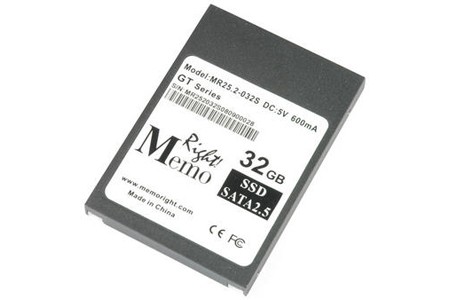
Tom’s Hardware has been running some tests to challenge the common assumption that SSD hard drives use power more efficiently than magnetic plate drives. Their results were quite definitive: not only are they not as energy efficient, SSDs actually use more power than conventional hard drives.
What they found is that most plate drives are at peak consumption (up to 4W) when accessing files fragmented across the media, which causes the actuator to move back and forth across the media several times. However, this is almost never sustained for extended periods of time; the actuator usually doesn’t move much when reading unfragmented data, and most plate drives are also capable of going idle when they are not in use.
Most SSDs on the other hand, only have two states: on and off. This means that when they are on, they are always at peak energy consumption. Though this number hovers around 2W for most of the SSDs they tested, over prolonged periods this can mean a great deal more power consumption than is immediately apparent, which can have short and long term effects on the battery life of a laptop. See the Tom’s Hardware article for benchmarks of specific products and more in-depth data.
















A very interesting article. I have issues with their writing style (hinting at the conclusion during the introduction makes it sound like they were aiming for the conclusion they got), but it’s a very informative article, and the first one I’ve seen that questions the SSD advantage. Now, someone needs to do a shake test to see if SSDs are more shock-proof…
what I’d like to see is tests done on CF card converters. CF cards reach about the same storage density (32gb), for about half the price (140usd, + 20usd for the converter)
looks like something ive seen inside a slot machine, could it be?
The results have already been shown to be questionable.
SSD hard drives also have MUCH slower than HDDs, something like 45mb/s. Their read speed is much faster though.
Can’t the ssd powerdown when not needed?
Interesting article but its really just a flaw with current generation SSD’s having no power saving features at the moment. There are a few flaws with the testing style but it does raise an issue that i hope will be fixed before SSD’s become mainstream!
In a laptop the backlight and CPU are bigger power sinks than the disk, so even if a SSD drew less power than a conventional one, this wouldn’t be that helpful at prolonging battery life. C’mon Hackaday – let’s see some low-power LCD backlight replacement projects!
It is a little more complicated. Flash is much lower power than a hard drive. However, a dozen flash chips raided together (to boost speed) are indeed more power hungry than a hard drive. The new generation of high speed SSD all do this.
Use different tech, and you reap the power savings. My battery life nearly doubled when I removed a 7200 rpm hard drive and replaced it with an SDHC card.
@Kyle
How did you do that actually…
Toms hardware’s conclusions seam pretty sound, but the guys at /. really tore this article apart http://hardware.slashdot.org/article.pl?sid=08/07/02/134256
@desire
You can get boards that will convert CF and even SD to sata and ide and such. Sometimes you can find a 2in1 that will raid a couple cards and still fit the laptop HD standard. Try dealextreme.
@desire
For a few years I’ve used a compact flash card in an cf-ide adapter, like bigd recommended. I got a new laptop, which had a sata hard drive. cf-sata adapters cost too much ($50), and the laptop had a built in sd card reader. I was worried the SD card would be too slow, but those fears were unjustified.
Long story short, simply popped the SD card into the laptop and installed an operating system from cdrom. The trick is to run linux. Even from flash, it will still run faster than windows.
Right now, the sweet spot is a 16 gb sdhc card. Alternatively, I’ve done one computer with a 16gb usb flash drive. Get out a soldering iron and flip an extra USB connector around, so the flash drive does not hang outside the laptop.
Hi, i’m just wondering about what you wrote (@desire).
I actually tried to install the OS on a SD card on my ASUS Pund-it computer and it didn’t work because the windows installation could not detect the SD card as a valid drive to install to. Was a while ago now, but think I tried with Ubuntu as well.
Is this a matter of me using a plain SD card instead of a SDHC card? So SD cards are not bootable but SDHC is?
Or perhaps just the MB/BIOS that didn’t support it?!
how come?
SSD is not there yet, rock on IDE :p